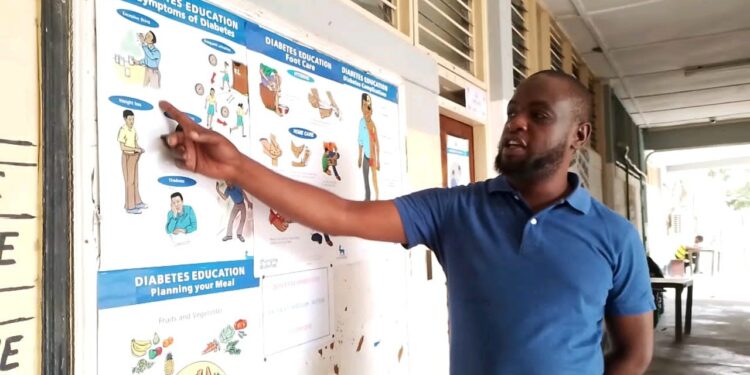Ignorance and lack of sensitization has led 6 out of 100 pregnant women get gestational diabetes in Kenya, World health organisation reports that 42 percent of women got gestational diabetes in 2019 and the number is set to rise to 58 percent if sensitization is not done effectively.
Member of Parliament of Kinango in Kwale County in Kenya has urged Kwale residents attend medical camps initiated by medical stakeholders in order to promote sensitization of gestational diabetes in Kwale County.
Speaking to media in Kwale County Member of Parliament of Kinango, Kwale County in Kenya, Samuel Gonzi Rai said that sensitization of gestational diabetes will inform pregnant women to live healthy lives while pregnant.

“We are making plans to ensure private medical stakeholders sensitize pregnant women at the grassroots level as diabetes has become a major disease in Kenya.” said Gonzi Rai.
Additionally Catherine Esther Wanjala a diabetic ambassador who has lived with diabetes for 18 years has urged Kenyans to incorporate diabetic persons in various activities to minimise stigma to diabetic patients.
” Many ladies do not tell their partners that they are diabetic as they fear rejection as many people feel diabetes is a burden ” said Catherine.
According to Esther, diabetic medicines and injections should be subsidized as it is costly to them. “Diabetic drugs are very expensive and many people do not know what we are going through, awareness to the public will make our lives better, also if we get free or subsidized prices for the medical equipment and medication it would be best.” explained the bubbly mother of 3.

Moreover Faith Munyu Titus ,a psychologist at Chiromo Hospitals noted that medical partnerships with other other countries will enable diabetic equipments and medications to be affordable.
“As gestational diabetes adds mental stress to the women, medical partnerships would attract reduction of prices as it is costly to maintain diabetes “said Faith.
According to the Faith, she had acquired gestational diabetes without knowing despite attending antenatal clinics during her pregnancy. “I lost my pregnancy and after that my gynaecologist opted I do more tests to ascertain if I had diabetes and the test proved it” narrated Faith.
However Dr.Hassan Ahmed Mkuche ,Samburu and Kinango Hospital in Kenya ,Kwale County empasized pregnant women to test their sugar levels so that they protect the unborn babies.
“Pregnant women should avoid using traditional medicines to treat diabetes, the traditional medicines are not tested and may end up having over dose of the medication” said Dr. Mkuche.

World Health Organization has advised African Countries to table bills and Acts in their parliaments to ensure laws are placed to enhance good lives of diabetic people and increase awarenessf in maintaing diabetic diets.
Kenya is on the move to implement the bills as it started tabling the conversations in Parliament. According to the Centre for Disease Control and prevention in Kenya ,gestational diabetes is a type of diabetes that results from blood sugar levels during pregnancy.
Pregnant women who have never had diabetes before but have high blood sugar levels during pregnancy are said to have gestation diabetes. The body lacks ability to to make use all the insulin it needs for pregnancy.
During pregnancy the placenta,releases a few hormones which aid in the foetus growing process where some of the hormones make it difficult for the body to make or use insulin and this leads to insulin resistance,inorder to keep the blood sugar levels in check.
The pancrease has to make atleast 3 times insulin than usual and if not enough insulin is made the blood sugar levels will rise and gestational diabetes will develop as a result.











